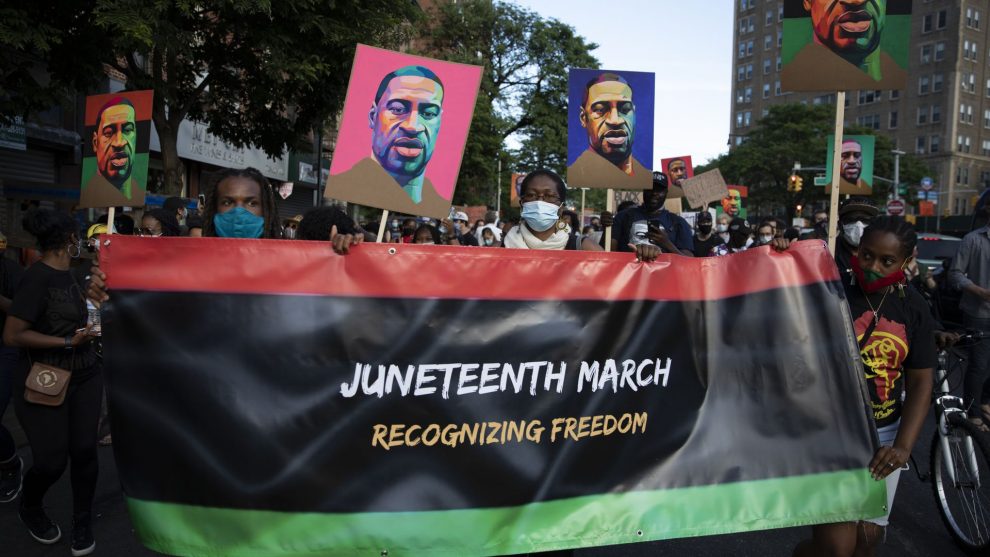The House voted to make June 19 a federal holiday that commemorates the end of slavery in the U.S., sending the legislation to President Joe Biden for his signature.
The legislation to establish the Juneteenth National Independence Day passed 415-14 on Wednesday, a day after it cleared the Senate by unanimous consent.
“With this step Congress is ensuring that one of the most momentous events in our history, particularly Black Americans, for 150 years now is officially recognized and it is enshrined in our history books and it takes it place of honor in our nation,” House Speaker Nancy Pelosi said Wednesday on the House floor before the vote.
The date known as Juneteenth marks the day when the last enslaved African Americans were ordered freed after Union troops arrived in Galveston, Texas, three years after the Emancipation Proclamation. Texas was the last Confederate state where the federal Army re-established its authority, and word of the Civil War’s end — and slavery’s abolition — had taken two months to arrive.
“I want to make Juneteenth a federal holiday to commemorate the end of chattel slavery, America’s original sin, and to bring about celebration, crushing racial divide down to a point of unity to this Earth,” said Texas Democrat Sheila Jackson Lee.
Dissent in House
Jackson Lee introduced legislation to designate the holiday in February as a companion to a measure introduced in the Senate by Republican John Cornyn of Texas and Ed Markey of Massachusetts.
Unlike in the Senate, there were dissenters in the House. Republican Rep. Matthew Rosendale of Montana depicted the bill as a weapon in the culture war in the U.S.
“This is an effort by the left to create a day out of whole cloth to celebrate identity politics as part of its larger efforts to make Critical Race Theory the reigning ideology of our country,” Rosendale said in a statement before joining 13 other Republicans in voting no.
GOP Rep. Clay Higgins of Louisiana said that while he was voting for the bill, he believed Democrats were using the legislation as “a trap for conservatives.” He said Democrats knew some Republicans would object to “the co-opting of ‘Independence Day’” which is already used for July 4.
”Why not be named the Juneteenth National Emancipation Day?” he said.
Juneteenth would become the 11th annual national holiday on the federal calendar. Federal employees would be given June 19 — or the Friday or Monday closest to it — as a paid day off.The last holiday added to the federal calendar was to honor the Reverend Dr. Martin Luther King Jr. on the third Monday of January. That was passed in 1983 after a 15-year effort and after overcoming a final attempt to block it with a filibuster by the late Senator Jesse Helms, a North Carolina Republican.
Senate Majority Leader Chuck Schumer said in a statement that creating the holiday “is a major step forward in recognizing the wrongs of the past, but we must continue to work to ensure equal justice and fulfill the promise of the Emancipation Proclamation and our Constitution.”
Cornyn’s Project
Juneteenth is already recognized by 47 states and the District of Columbia as an official state holiday or observance. Texas was, in 1980, the first state to put it on its calendar. Some companies including, Target Corp., Nike Inc. and Twitter Inc., already designate the day a paid holiday and others may follow with the federal designation.
Cornyn has sponsored a resolution to commemorate Juneteenth every year since 2011. He co-sponsored legislation to make the date a federal holiday last year, but it was blocked by Senator Ron Johnson, a Wisconsin Republican, who objected to the cost of giving federal workers another paid holiday.
The push to make it a federal holiday gained momentum in the wake of worldwide protests following the death of George Floyd, a Black man who was killed by a White Minneapolis police officer on May 25, 2020.
This year, Cornyn joined with Markey to sponsor the legislation making it a federal holiday in the Senate along with Jackson Lee in the House and the growing recognition of the need for a national reckoning on race helped push it toward passage.
The Senate was able to act unanimously after Johnson dropped his objection.
“Although I strongly support celebrating Emancipation, I objected to the cost and lack of debate,” Johnson said in a statement Tuesday. “While it still seems strange that having taxpayers provide federal employees paid time off is now required to celebrate the end of slavery, it is clear that there is no appetite in Congress to further discuss the matter.”
Story cited here.
























